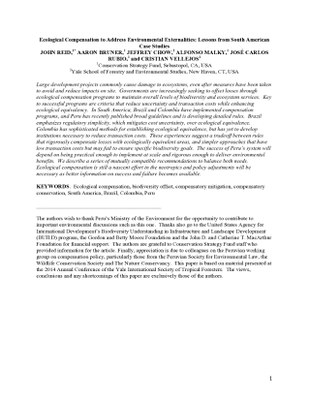Ecological Compensation to Address Environmental Externalities: Lessons from South American Case Studies
Large development projects commonly cause damage to ecosystems, even after measures have been taken to avoid and reduce impacts on site. Governments are increasingly seeking to offset losses through ecological compensation programs to maintain overall levels of biodiversity and ecosystem services. Key to successful programs are criteria that reduce uncertainty and transaction costs while enhancing ecological equivalency. In South America, Brazil and Colombia have implemented compensation programs, and Peru has recently published broad guidelines and is developing detailed rules. Brazil emphasizes regulatory simplicity, which mitigates cost uncertainty, over ecological equivalence. Colombia has sophisticated methods for establishing ecological equivalence, but has yet to develop institutions necessary to reduce transaction costs. These experiences suggest a tradeoff between rules that rigorously compensate losses with ecologically equivalent areas, and simpler approaches that have low transaction costs but may fail to ensure specific biodiversity goals. The success of Peru’s system will depend on being practical enough to implement at scale and rigorous enough to deliver environmental benefits. We describe a series of mutually compatible recommendations to balance both needs. Ecological compensation is still a nascent effort in the neotropics and policy adjustments will be necessary as better information on success and failure becomes available.
https://biodiversitylinks.org/projects/completed-projects/build/resources/ecological-compensation-to-address-environmental-externalities-lessons-from-south-american-case-studies/view
https://biodiversitylinks.org/projects/completed-projects/build/resources/ecological-compensation-to-address-environmental-externalities-lessons-from-south-american-case-studies/@@download/image/image.jpg
File
Ecological Compensation to Address Environmental Externalities: Lessons from South American Case Studies
Large development projects commonly cause damage to ecosystems, even after measures have been taken to avoid and reduce impacts on site. Governments are increasingly seeking to offset losses through ecological compensation programs to maintain overall levels of biodiversity and ecosystem services. Key to successful programs are criteria that reduce uncertainty and transaction costs while enhancing ecological equivalency. In South America, Brazil and Colombia have implemented compensation programs, and Peru has recently published broad guidelines and is developing detailed rules. Brazil emphasizes regulatory simplicity, which mitigates cost uncertainty, over ecological equivalence. Colombia has sophisticated methods for establishing ecological equivalence, but has yet to develop institutions necessary to reduce transaction costs. These experiences suggest a tradeoff between rules that rigorously compensate losses with ecologically equivalent areas, and simpler approaches that have low transaction costs but may fail to ensure specific biodiversity goals. The success of Peru’s system will depend on being practical enough to implement at scale and rigorous enough to deliver environmental benefits. We describe a series of mutually compatible recommendations to balance both needs. Ecological compensation is still a nascent effort in the neotropics and policy adjustments will be necessary as better information on success and failure becomes available.



